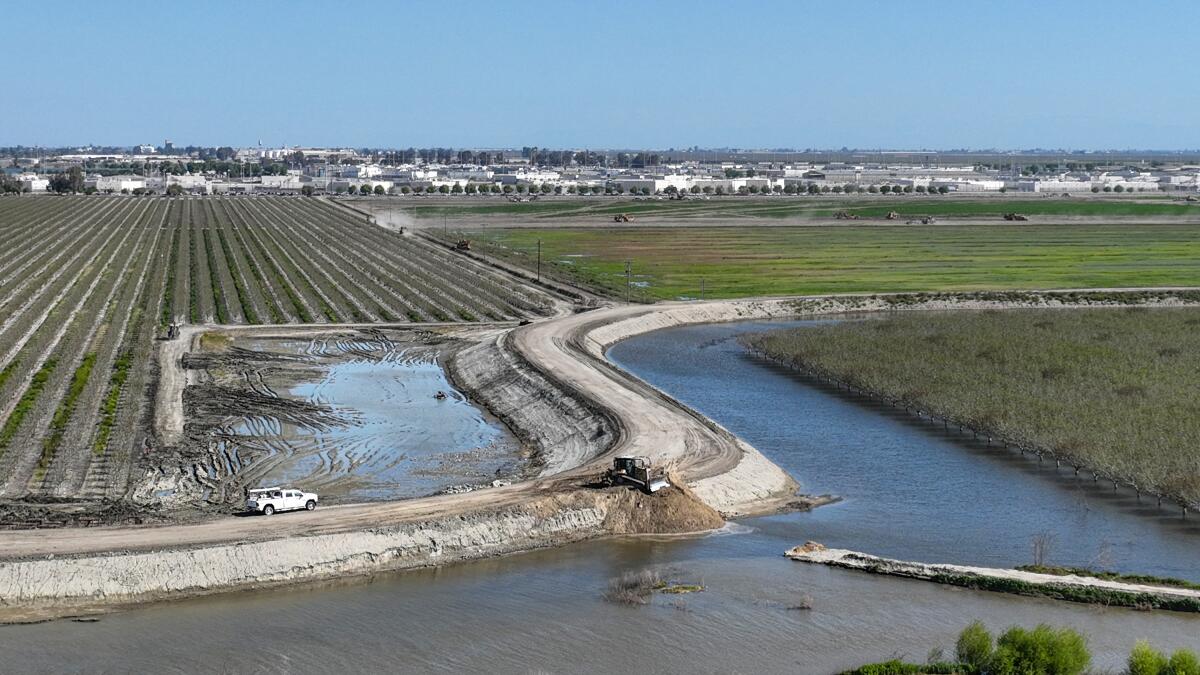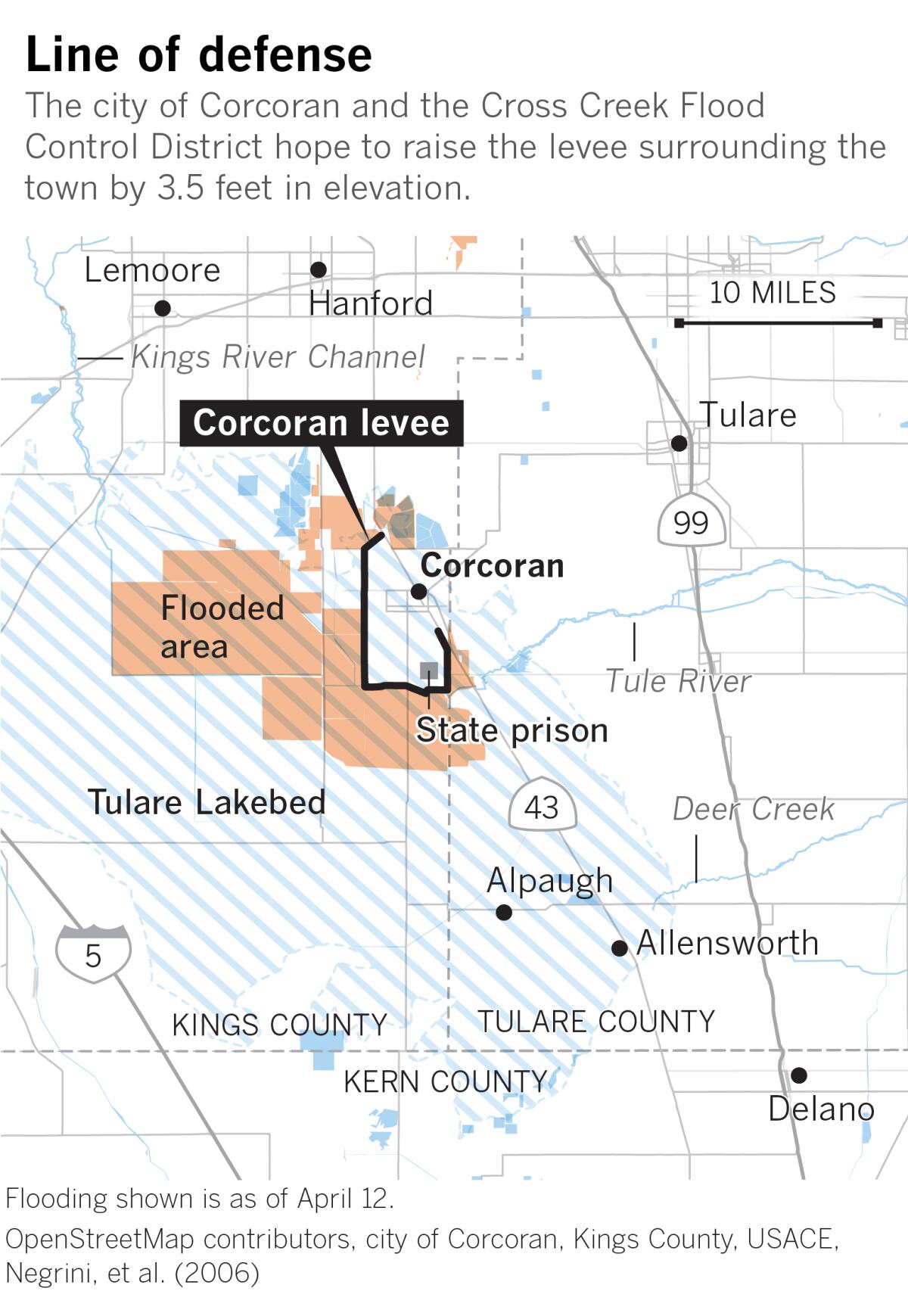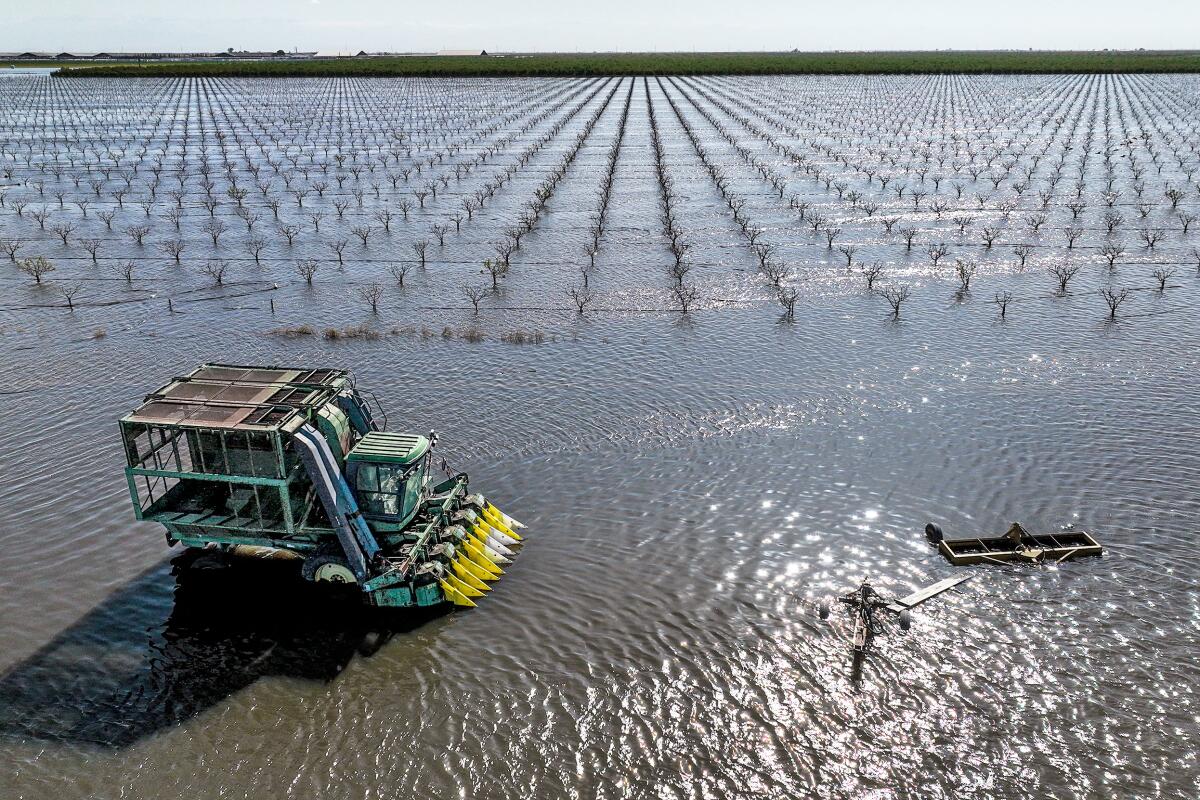A California farming town braces for what could be a catastrophic snowmelt

Good morning, and welcome to the Essential California newsletter. It’s Tuesday, April 25.
A heat wave is headed straight for Central California’s massive snowpack this week, which forecasters say could trigger rapid melting in the mountains and flooding in the San Joaquin and Owens valleys.
Regional temperatures could climb into the mid-90s beginning Wednesday and into the weekend. And with lows expected in the 40s, the Sierra Nevada snowmelt could start running around the clock.
“The ‘big melt’ is now here,” UCLA climate scientist Daniel Swain told my colleague Hayley Smith. “We said there would eventually be some week between about March and May when the rate of snowmelt dramatically increased, either due to a heat wave or late-season warm storm. I think this is probably that week now.”
A civic nightmare
In one town, the threat of melting snow promises “a civic nightmare.”
My colleagues Jessica Garrison, Susanne Rust and Ian James traveled to Corcoran, Calif., a small farming town in the Central Valley. As of two months ago, the town has a brand-new neighbor: Tulare Lake, a vast, murky sea that did not exist two months ago.
A 14.5-mile dirt levee is all that protects the community of about 22,000 from all that water.
But as mountain snow melts and fills the nearby Tule River, city officials and residents fear the rising waters could cause a catastrophic breach.

“People are scared,” local farmer Kirk Gilkey told my colleagues. “[If] Corcoran floods, it’ll be a ghost town after. It won’t survive.”
The majority-Latino town is home to many farmworkers whose livelihoods are already in jeopardy from earlier flooding that inundated fields and poses long-term threats to crops vital to the region’s economy. The long-dry basin of vineyards, orchards and other agriculture remains engulfed in floodwater.
Shifting responsibility
Corcoran’s leaders have been trying to secure state and federal funds to reinforce the levee and raise it by 3.5 feet. As local funds dry up, City Manager Greg Gatzka said the city has heard that state and federal officials are “working on” assistance for the levee. “It needs to come faster.”
Gatzka is “beyond frustrated” by the difficult process of securing emergency funding and may end up asking local farmers to donate to support the project as a “desperate last resort.”
If those efforts fail, the floods come and the levee cannot hold, farmers will not be the only ones affected. There are about 8,000 men incarcerated in a massive state prison complex near the levee’s southeastern edge.
“Rumors abound that the prison is secretly evacuating prisoners in advance of flooding,” my colleagues wrote. A spokeswoman for the Department of Corrections denied those rumors but said the facility has stopped accepting new prisoners.
So how are state and federal officials responding? Jessica, Susanne and Ian write that “officials at several state and federal agencies said they are monitoring the situation closely but referred questions — and responsibility — back to local officials.”

And now, here’s what’s happening across California:
Note: Some of the sites we link to may limit the number of stories you can access without subscribing.
L.A. STORIES
Monday marked the 108th anniversary of the start of the Armenian genocide. Several commemorative events were held throughout L.A. County, home to the largest population of Armenian Americans in the U.S. LAist
Was it the worst idea ever? Times food columnist Jenn Harris asked ChatGPT to tell her where to eat in L.A. for a week, then followed the artificial intelligence chatbot‘s suggestions. Los Angeles Times
POLITICS AND GOVERNMENT
A Hanford woman’s ex-husband was supposed to have been under a restraining order that prohibited him from buying a firearm. But the man was able to purchase a pistol, which he used to kill their 10-year-old son, them himself. The bereaved mother is on a quest to find out how, in gun-strict California, the law was so easily skirted. Los Angeles Times
On Monday in Monterey Park, where a gunman killed 11 people in January, lawmakers urged support for a trio of gun control bills. One seeks to increase measures to ensure that guns are relinquished during a conviction. Los Angeles Times
Efforts to build more housing in the wealthy enclave of La Cañada Flintridge have faced protests, lawsuits and a dead rat in the mail. But the latest group eyeing a parcel for affordable housing could fare better, thanks partly to the city’s own resistance to complying with state housing law. Los Angeles Times
California Lt. Gov. Eleni Kounalakis has announced her bid to succeed Gov. Gavin Newsom and become the first woman to lead the state. With more than 3½ years before that 2026 election, she has an early start on her eventual opponents. Sacramento Bee
CRIME, COURTS AND POLICING
Five Sacramento firefighters violated policy by not intervening when a Black man they were attempting to treat was held down by police officers in a dangerous position, causing his death, city documents reveal. The firefighters had responded to a medical emergency call to give Reginald “Reggie” Payne a glucose shot, but soon called police to restrain him. Sacramento Bee
An “embarrassing” sting operation conducted by Riverside County sheriff’s deputies resulted in the agency losing 60 pounds of meth to a trafficker. Undercover deputies sold the drugs to a suspect who then drove off, evading arrest. Los Angeles Times
Newsom has enlisted the California National Guard and the California Highway Patrol to help San Francisco address the ongoing fentanyl crisis. The announcement is being criticized by some city leaders for lacking details about how the partnership will work, with one city supervisor calling it Newsom’s “latest publicity stunt.” Los Angeles Times
Support our journalism
HEALTH AND THE ENVIRONMENT
An office building in San Diego County was closed after bacteria that causes Legionnaire’s disease was found. The Mission Valley facility houses offices of several state agencies, including the enforcement branch of Cal/OSHA. San Diego Union-Tribune
Have you “herd” about San Francisco’s unique wildfire prevention team? It’s a group of grazing goats, munching down newly sprouted greenery before it dries out and becomes potential fire fuel. 🐐 CBS News
Free online games
Get our free daily crossword puzzle, sudoku, word search and arcade games in our new game center at latimes.com/games.
AND FINALLY
Today’s California landmark is from Linda Edgar of Long Beach: Tribute to the Roughnecks — a sculpture of oil men on top of Signal Hill.

Linda writes:
The discovery of oil was a rich part of California history. It was similar to a gold rush, bringing a [flurry] of speculators. At one point Signal Hill was covered with a forest of oil wells. Some homeowners in Long Beach still get monthly checks from oil companies for oil pumped from below their land — oil that was later made into gasoline for our growing car culture.
What are California’s essential landmarks? Fill out this form to send us your photos of a special spot in California — natural or human-made. Tell us why it’s interesting and what makes it a symbol of life in the Golden State. Please be sure to include only photos taken directly by you. Your submission could be featured in a future edition of the newsletter.
Please let us know what we can do to make this newsletter more useful to you. Send comments to essentialcalifornia@latimes.com.
Sign up for Essential California
The most important California stories and recommendations in your inbox every morning.
You may occasionally receive promotional content from the Los Angeles Times.



